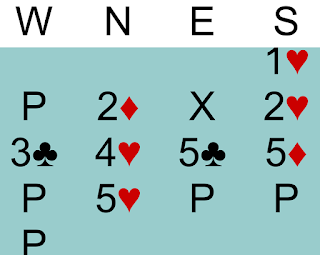The second weekend of the National League was this weekend. Full results are available here. Congratulations to the team of Mike Ash, Alex Adamson, Finlay Marshall, Arend Bayer and Patrick Home, who won the division. They went in as favourites (and in fact would only narrowly have missed out on automatically being in the first division), and won out in the end. Congratulations also to the Burn team, who will get to play in the First Division next season. Also well done to Brian Short, Alan Goodman, Sam Punch and Stephen Peterkin, who won the first division with over a match to spare (Derek Saunders also played in that team, but I think he only played the Saturday of the second weekend, so hadn't played enough boards to qualify for the Camrose). Phil S and Frazer will be the third pair in the Camrose team for the first weekend, with Alex and Phil M as their reserves.
We did a lot better in the second weekend than we did in the first, but had left ourselves with just too much to do to catch the teams in front. Even beating the Burn team 15-5 on Saturday didn't do enough to close the gap when we narrowly lost a couple of matches in the afternoon. We had the best score in the second weekend, narrowly ahead of Ferguson and Adamson. Here's a full table with scores from both weekends (since the version on the national league website requires you to do some arithmetic).
| Captain | First Weekend Score | Second Weekend Score | Total Score |
| ADAMSON | 87.7 | 78.08 | 165.78 |
| BURN | 90.1 | 70.48 | 160.58 |
| FABEN | 64.22 | 85.44 | 149.66 |
| SHENKIN | 74.69 | 67.45 | 142.14 |
| FERGUSON | 56.41 | 81.37 | 137.78 |
| CLOW | 53.25 | 69.69 | 122.94 |
| GUTHRIE | 53.43 | 67.13 | 120.56 |
| WICKENS | 81.83 | 36.73 | 118.56 |
♣♦♥♠
Adam opened the North hand 1S. By agreement we open most 7 loser 8 counts, and he has a 5 loser 7 count, so this isn't horribly off system (he does have ways of showing a longer minor in most auctions). East decided not to bid, and after a bit of thought, I bid 3NT. I wasn't sure whether we had any explicit agreement about 3NT, but it pretty much has to show this sort of hand. Adam asked me what my minor was with 4C, and when he jumped to 6, I figured that AKQJ9754 was almost certainly a better trump suit than whatever he had in mind, and corrected. East wasn't kind enough ot make a Lightner double, so I rolled in an easy 940. Note that you can make 7 of either minor, but only if you arrange to play it from the short hand to avoid the ruff.
The auction went slightly differently at the other table:
Having right-sided the contract, there was no lead that could avoid a couple of overtricks in this contract, and we chalked up 18 IMPs for 940+850... Note that 13 tricks in hearts are cold if played by East, but West can only make 12.
We spent a few minutes in the pub wondering if you could construct a hand where each player can make exactly one grand slam, before realising that we pretty much had a template for one here - swap a few of North's spades with a few of East's diamonds, and West is cold for 13 tricks in spades, whereas East can only make 12. Each player can make exactly one grand slam.
♣♦♥♠
I've enjoyed playing the National League this year, and will definitely be looking to enter again next season. Whether Adam and I will stick with the strong diamond, or find anyone who's willing to play in a team with us if we do is yet to be seen...
The organisers currently have a consultation going on to come up with suggestions for the format. While obviously I have a selfish interest in keeping the second/third divisions as they were at the end of this season, I'm not convinced I'd bother entering if I knew I had to play in the third division for both weekends, so I think there's probably a good argument for keeping the format the same as it was this year. It also seems fairer to people who didn't enter this year for whatever reason, or want to rearrange their teams. Given that the league is essentially an international trial, I think that for it to take a full 2 years before you can even get into a position to be eligible for international selection is probably a bit much.
It did feel slightly unfair that the shorter matches in the first weekend counted the same as the longer matches in the second weekend, but at least in the second division they weren't that much shorter (and we still wouldn't have made it into second place even if you scaled up the second weekend scores by a factor of 16/11), so overall I think the format worked, I just wish we'd managed to play a bit better in the first weekend, so we could at least have kept it interesting.





















